Several months after many communities of Kogi State experienced one of the most worst and devastating flood avalanches in history, residents have continued to battle and live with its health impact. This is even as the state government continues to insist that it has done enough to ensure its citizens are able to bounce back from the challenges posed by the floods.
The State further debunked any claim that it had experienced a disease outbreak in the aftermath of the flood which has been mainly attributed to climate change.
According to the World Health Organization (WHO), climate change has become humanity’s single biggest health threat, and health professionals worldwide are already responding to the health harms caused by this unfolding crisis. While no one is safe from this risk, it is safe to say that people who are least likely to protect themselves and their families against it are mostly people from low-income and disadvantaged communities.
With Kogi State being among the worst-hit states of the 2022 floods in Nigeria, the vulnerable residents are currently battling its devastating impact in a myriad of ways. It is becoming increasingly more challenging if not virtually impossible to access accurate data due to the dearth or lack of it or the unwillingness of the relevant authorities to provide it. Thus it has become difficult to estimate the scale of climate-sensitive health risks accurately.
However, Persecondnews Correspondent, Yemi Balogun, conducted a comprehensive research among stakeholders and communities which revealed that communities in Kogi State have continued to suffer a rise in heat waves, water-related diseases such as (typhoid, cholera, water diarrhea), skin infection, malnutrition due to low food quality, malaria, and psychological issues leading to trauma.
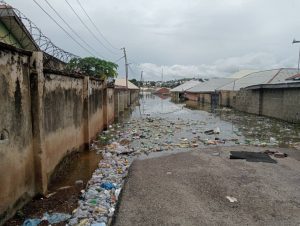
State Epidemiologist Counters NCDC on Outbreak of Cholera Post-Kogi Floods
Giving a summary of the after-flood disaster, the State Epidemiologist, Kogi State Ministry of Health, Dr Austine Ojotule says there are no outbreaks of diseases traceable to the flood crisis as of press time.
However, the National Center for Disease Control (NCDC) Cholera Situation Report, Epidemiological Report-10, posted on January 5th, 2023, states that Kogi is one of the 32 states that have reported suspected cholera cases in 2022, as shown in the table below.
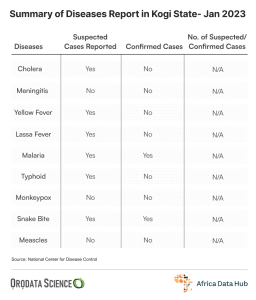
Given the data above, Dr. Austine Ojotule maintained that no major significant complaints or diagnoses related to other forms of contamination, such as water and food, even though the data were still being processed for analysis.
He said this is because the Ministry in collaboration with other partners, conducted Initial Rapid Needs Assessment (IRNA) in the flood-affected LGAs to identify the immediate health impacts of the disaster on the affected population being aware of the explosion in the population of Internally Displaced persons at their camps.
He identified irregular water supply and exposure to all sorts of insect bites and mosquito bites which brought about an increase in malaria as the prevalent flood-related disease in the camps.
He said mosquito nets were provided, while health personnel were immediately deployed to the IDP camps to provide free medical services to avoid an outbreak of epidemic.
“I can objectively tell you that there have not been any serious health issues that went beyond the capacity of the state since the flooding incident,” Ojotule told Persecondnews.
In their various submissions, medical experts in the state have also agreed that there could be after-flood psychological behaviours which victims of disaster may show as they continue to count their losses.
According to medical experts, coping with the realities could be overwhelming which may breed depression and trauma that victims might not be able to recover from psychologically due to the shocks from the incident. They say people cannot be satisfied with whatever intervention that is being provided for them to relieve them of stress/trauma since they cannot carry out their usual routines and are afraid of returning to their homes for fear of drought.
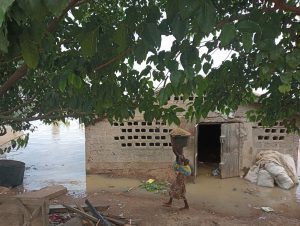
They maintained that when people are clustered in a particular area, there is bound to be an outbreak of communicable diseases if they are not careful with sanitation and public health, especially where there is open defecation.
They also noted that when there is a flood disaster, a lot of contaminated substances flow from one place to the other which could breed cholera outbreak, typhoid fever, contaminated water sources leading to water pollution, and malaria due to spikes in mosquito bites, spikes in snake bites as reptiles will invade flooded areas having being displaced from their natural habitats.
They advocated enough sensitization to residents, more support for victims, and continued improvement in medical services to victims to suppress post-flood trauma while urging residents to maintain a high level of hygiene in their environments.
Government Intervention Failed to Reach Vast Majority of Victims – Community Leader
According to the Etsu Adankolo, one of the prominent community leaders in Kogi State and royal father, Chief David Aibe Agbayi II, more than 20,000 people were sampled by a group of non-governmental organizations, but only 200 persons were catered for as a result of the limited resources at the disposal of the organization.
This, according to him, can be said to be a fallout from the state government because of its inability to meet up with the needs of the vast number of victims at the time of the disaster as the government itself was overwhelmed by the disaster.
Chief Agbayi II says even though the government carried out intervention activities, it failed to reach many affected people, adding that most people have returned to their villages in protest of the inequitable distribution of relief items.
He, therefore, urged the government to fulfill its promise of allocating land to displaced house owners to get them out of the trauma they have been subjected to due to the crises.
Some of the flood victims, who were sampled in Gadumo, 200 unit, Ganaja, Koton-Karfe, and Ajaokuta communities, alleged that the allocation of relief items and cash gifts to their IDP camps were not delivered to their doorsteps even after collecting their data.
They revealed that reptiles have continued to slither around freely in their environments and also complained of too much heat emanating from their camps due to overpopulation, open defecation due to lack of public toilets in some of their camps, insecurity as well as lack of potable water as they were forced to trek several kilometers in search drinking water for domestic use.
The table below shows casualties from the Nigerian flood in 2022
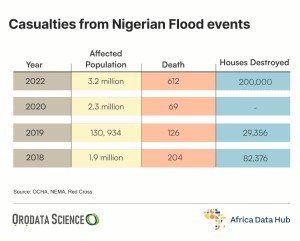
Commissioner Speaks on Way Forward
Meanwhile, Kogi State Commissioner for Environment, Mr Victor Omofaiye, says as part of efforts to avert future flood disasters, his ministry has embarked on operational activities such as the removal of illegal structures, heaps of refuse and debris associated with flood from public places, water bodies and blocked drainages.
He revealed that the ministry has set up an ecological and flood assessment team to conduct checks across the 21 LGAs, to survey and monitor environmental degradation and generate data on gully erosion, damaged drainages, and affected infrastructure to be deployed for the data on flood disasters.
In a bid to reduce climate-sensitive health risks, Omofaiye said toilets would be provided at IDP camps for proper collection of waste and disposal and to maintain good hygiene.
When asked about the use of the ecological fund, the commissioner said he could not comment on it because the fund is not under his control.
Notably, the Sustainable Development Goals (SDG) Goal-13, which deals with climate change, calls for urgent action to combat climate change and its impacts linked to all the 16 other Goals of the 2030 Agenda for Sustainable Development. Goal-13 aims explicitly to strengthen resilience and adaptive capacity to climate-related hazards and natural disasters.
In conclusion, the impact of climate change generally with the life-threatening hazards on the people particularly the poor and farmers both men and women is exacerbating with no feasible action taken by the authorities to address beyond annual rituals of wailings, sympathy, and promises as well as lack of accountability in the deployment and use of the ecological funds given to states by the federal authorities.
Getting resources across to victims of the perennial floods to manage the effects of severe, austere, and discomforting climate change is imperative and non-negotiable.
Equally germane is the enforcement of policies by the different layers of government in the country as “poor regulations and gaps in implementation” have continued to endanger the lives of millions of Nigerians.
This story is supported by the Africa Data Hub (ADH) Community Journalism Fellowship.












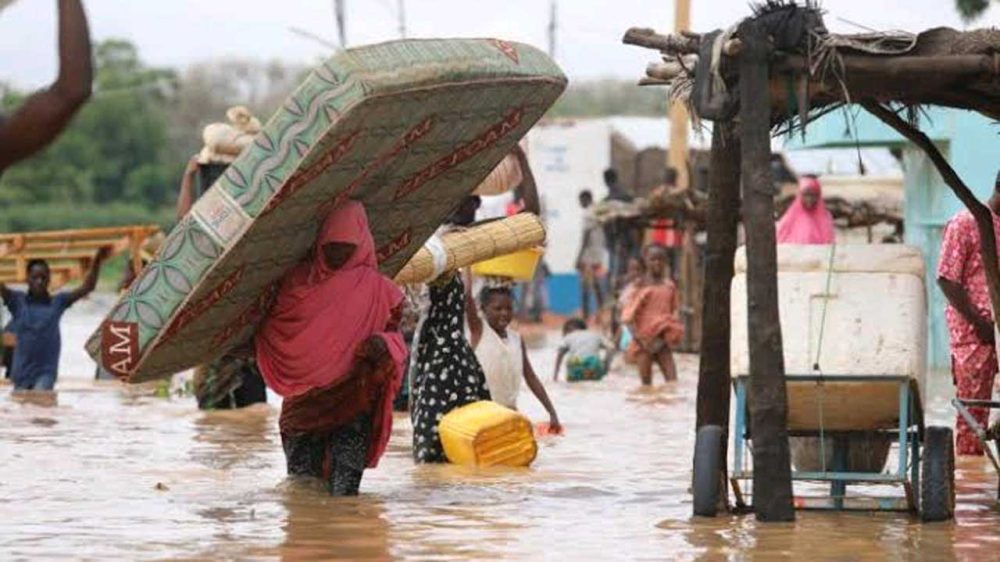











Leave a comment